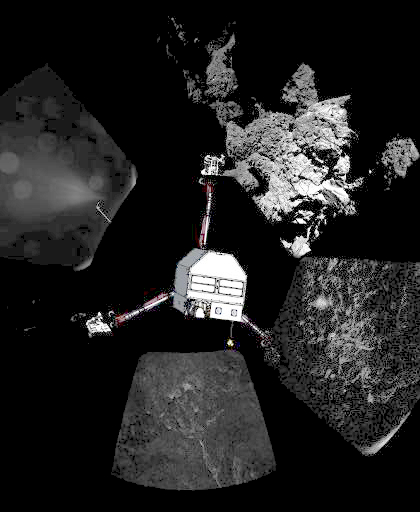Philae fills Rosetta for years of mulling-over
 Europe's science probe Philae has gone quiet for a bit, after making its mark on global media, the scientific world and the comet on which it landed.
Europe's science probe Philae has gone quiet for a bit, after making its mark on global media, the scientific world and the comet on which it landed.
Philae sent a treasure trove of data its power ran out, mission control said on the weekend, with the latest pile of information seen as a crown on the probe’s already princely performance.
The robot lab was able to stream data from a range of experiments back to its mother ship Rosetta in the hours before its battery ran down.
The data included the eagerly-awaited outcome of a chemistry test of a sample drilled from the comet's dusty, icy surface.
“Rosetta's lander has completed its primary science mission,” the European Space Agency (ESA) said.
It was hoped that Philae would have more than the 60 hours of battery power it landed with, if it could be charged by the Sun while on the back of the comet. However, it landed in the shadow of a large cliff that prevent the solar batteries from recarhgin for now.
Still, “the data collected by Philae and Rosetta is set to make this mission a game-changer in cometary science,” said Matt Taylor, Rosetta project scientist.
In fact, the data that Philae and Rosetta collected in just a few short (Earth) days should keep experts calculating and extrapolating for years.
Mission engineers say they could even contact the lander again in the coming months, as Comet 67P/Churyumov-Gerasimenko hurtles towards the Sun.
Despite a rough landing, Philae’s toolkit of 10 instruments took pictures, measured the comet's density, temperature, and internal structure, “sniffed” molecules of gas from the surface and even drilled a core of material out of the comet surface to analyse its chemical signature.
“We received everything,” mission scientist Jean-Pierre Bibring told AFP.
“The word is ‘fabulous’, just fabulous,” he said.
The first report from the mission will be presented at a meeting of the American Geophysical Union (AGU) in San Francisco next month.
The comet dubbed “67P” will loop around the Sun next year, throwing gas in an icy trail before slinging back out towards the depths of the solar system.
Rosetta will escort it throughout next year.








 Print
Print